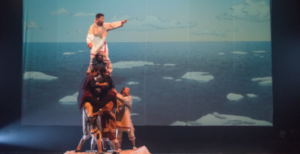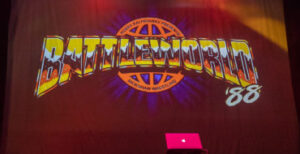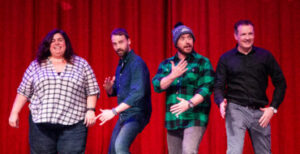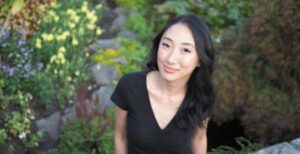
Saturday night, The Rio Theatre played host to the culmination of the second annual Vancouver International Poetry Festival.
There’s an emotional vacuity that results from the ending of something so emotionally vertiginous. It’s as if the coils of one’s heart have been slowly unwound and stretched along the streets of Commercial Drive. Everyone can see, but it’s all right because everyone else’s arteries and veins are there, too. The overwhelming degree of sentiment bleeds with the rain into the gutters and becomes just another puddle.
But I’m getting ahead of myself.
Saturday afternoon, Eternal Abundance held a Haiku Death-match, a casual affair for poets and day-drinkers. Everyone’s head was still clearly fogged from the previous evenings’ Nerd and Erotica Slams, so the haikus tended toward vulgarity, humor and science fiction. Though some audience members were clearly unprepared for the ribald nature of the afternoon, I had come to expect nothing else from our illustrious poets (I giggled the entire time).
And so, to honor Saturday afternoon, I make a paltry offering of my own haiku:
Andre Prefontaine
Won the match. My favorite?
Haiku in Klingon.
(And yes, that actually happened. It was amazing.)
It’s a good thing the afternoon was spent in levity. Anything more grave might have left me broken before the Indie Slam Finals, which would not have done. I needed to laugh before I cried.
Five poets who did not make it to the finals were asked by festival organizers to repeat some of their best work for the crowd. The audience was treated to reiterations of work by Kayla Fraser, Aaron Simm, Andre Prefontaine, Knowmadic and Holly Painter; all excellent performances that highlighted just how rigorous this competition has been.
Charles Hamilton brought a playful quality to his emcee duties, thank goodness. The weightiness of the poetry was so great that his brief interludes provided much-welcome respite from the solemnity saturating the air of the theatre. Yes, dear reader, I still cried, but Hamilton refreshed us, made us chuckle a little and ensured that we would be ready to cry again.
Every poet takes a breath before they start. This is, after all, the big time. A week of poetry, of nightly performances and daily practices; of overwhelming anxiety and overwhelming community; have come down to this. The title is important, but not as important as the soul denuded onstage.
If there’s one thing any uninitiated takes from what I write here, let it be that the spoken word is one of the most beautifully vulnerable arts. These performers are willing to bare themselves onstage in ways most of us never have the courage to do in private. It’s more than an unmasking; it’s sheer revelation.
And so every poet takes a breath before they start. They look to the red curtain behind the stage or to the ground immediately beside the microphone. There’s a quiet moment, a moment of taut air and clarity. The poet needs it, but so does the audience.
A new lesson from this week: The poet who performs first in a slam competition is said to “bite the bullet.” Score-creep, which we discussed in day five’s dispatch, tends to benefit performances toward the middle and end of the competition. Blame goodwill or the drink, the result is the same.
The bullet-biter for this particular show was Matthew Christopher Davidson, whose piece on alcoholic bloodlines (performed in a surprisingly good Scottish accent) could have maybe used a bit more goodwill. The judges at The Rio were harsh and while they got a bit nicer as the night went on, it seemed that they were setting out to establish that they the importance of the competition and would accept nothing short of utter brilliance.
The first round consisted of Davidson and the nine other finalists from the previous two evenings: Winona Linn, RC Weslowski, Ritallin, Loh’El, Jen Kunlire, Ryan Thom, Fannon, Colin Matty and Alessandra Naccarato. The theatre echoed tiny snaps expressing appreciation for beautifully wrought lines or well-loved pieces, a signal of respect passed down from a time when people still smoked in cafes.
The art of artistic selection came across as well: A performer needs to impress the judges in the first round in order to progress to the next; but also needs to reserve the most powerful pieces for the final round, when the title itself is on the line. There’s a complex formula that the best slam poets manage to calculate and utilize, but it’s ineffable. Every poet started off strong and only got stronger, more forceful, more fervent and impassioned as the rounds went on.
The field was narrowed after the first round from ten poets to seven: Weslowski, Ritallin, Loh’El, Kunlire, Fannon, Collin Matty and Naccarato stayed in while Ryan Thom, Davidson and Linn left the stage. Starting with RC Weslowski’s gut-wrenching piece on working through trauma with art (a stark contrast from his fantastically obscene ode to the blue collar worker in the first round), the performances become fiercer and more emotionally raw as your reporter became more and more tearful, breaking down completely at Loh’El’s mid-round poem on the emotional ravages left in the wake of suicides.
I’ve been crying all week, and have tried to communicate as much. But this, reader, was different: I fell into sobs during the piece and could barely pull myself together for the rest of the show. Never has a performance, or perhaps I should say, the cumulative effect of performance, put me in tears like Saturday night at The Rio. I’m not certain I could give a better recommendation than that.
Every single poem in this round amazed me, including Holly Painter’s incredible showcase piece on female circumcision. Colin Matty screamed, “Show me what you care about!” and I wanted to; Naccarato said she liked one-night stands like her coffee and I wanted to brew her a cup. Kunlire on the damage done by Barbie and the colonization of beauty and Ritallin on the alienation of non-white Canadians (“My Home is Here,” an anthem for non-immigrants sick of being asked where they come from) presented exquisite challenges to whitewashed narrative.
Fannon gave an incredibly challenging piece on the intergenerational pain of domestic violence. The poem explored the burden carried by sons of spousal abuse with an honesty and ferocity that perhaps the judges wouldn’t abide or couldn’t receive. Fannon’s piece and vehement delivery was, in my opinion, one of the most powerful of the night.
Still, the field had to be pared to just four poets: Colin Matty, Weslowski, Ritallin and Kunlire made the final cut. Weslowski bit the bullet again and offered a crazed burlesque (“Why Stephen Harper Hates Funding for the (f-)Arts Or, Flatulence”) that I can’t describe but somehow touched on everything under the sun, from In-Site to masturbation to artist grants. I really have no idea how he did it or how to describe it, but suffice it to say that it won the Vancouver-based poet a standing ovation, at least one ten and the title of Canadian Individual Slam Champion.
Ritallin took second for his bone-chilling “Machete Smile,” delivered with an anger and poignancy of the darkest personal story. Colin Matty’s gorgeously crafted and skillfully performed cowboy poetry secured him third place, while Jen Kunlire’s disturbing piece on sexual violence took fourth.
This week has been incredible. As a relative newcomer to the world of slam poetry, I have been continually stunned at the courage, beauty and talent of the poets. They welcomed me into their community with open arms; showed me the ropes and their homes; gave me hugs and inspiration. Every night was amazing, and every day felt like a bizarre interlude between performances. Special thanks go to volunteer coordinator Sonya Littlejohn and Slam Masters Duncan Shields and Sean McGarragle for their guidance. Thanks to every poet I met and didn’t meet; travel safely back to your homes and keep promoting your art.
If by some off chance you came to my dispatches without knowing anything about slam poetry and would like to know more, Café Deux Soleils holds a poetry slam nearly every Monday. Check it out, and if you think you can do better, sign up. This world needs all the poets it can get.
 Saturday night, The Rio Theatre played host to the culmination of the second annual Vancouver International Poetry Festival.
There’s an emotional vacuity that results from the ending of something so emotionally vertiginous. It’s as if the coils of one’s heart have been slowly unwound and stretched along the streets of Commercial Drive. Everyone can see, but it’s all right because everyone else’s arteries and veins are there, too. The overwhelming degree of sentiment bleeds with the rain into the gutters and becomes just another puddle.
But I’m getting ahead of myself.
Saturday afternoon, Eternal Abundance held a Haiku Death-match, a casual affair for poets and day-drinkers. Everyone’s head was still clearly fogged from the previous evenings’ Nerd and Erotica Slams, so the haikus tended toward vulgarity, humor and science fiction. Though some audience members were clearly unprepared for the ribald nature of the afternoon, I had come to expect nothing else from our illustrious poets (I giggled the entire time).
And so, to honor Saturday afternoon, I make a paltry offering of my own haiku:
Andre Prefontaine
Won the match. My favorite?
Haiku in Klingon.
(And yes, that actually happened. It was amazing.)
It’s a good thing the afternoon was spent in levity. Anything more grave might have left me broken before the Indie Slam Finals, which would not have done. I needed to laugh before I cried.
Five poets who did not make it to the finals were asked by festival organizers to repeat some of their best work for the crowd. The audience was treated to reiterations of work by Kayla Fraser, Aaron Simm, Andre Prefontaine, Knowmadic and Holly Painter; all excellent performances that highlighted just how rigorous this competition has been.
Charles Hamilton brought a playful quality to his emcee duties, thank goodness. The weightiness of the poetry was so great that his brief interludes provided much-welcome respite from the solemnity saturating the air of the theatre. Yes, dear reader, I still cried, but Hamilton refreshed us, made us chuckle a little and ensured that we would be ready to cry again.
Every poet takes a breath before they start. This is, after all, the big time. A week of poetry, of nightly performances and daily practices; of overwhelming anxiety and overwhelming community; have come down to this. The title is important, but not as important as the soul denuded onstage.
If there’s one thing any uninitiated takes from what I write here, let it be that the spoken word is one of the most beautifully vulnerable arts. These performers are willing to bare themselves onstage in ways most of us never have the courage to do in private. It’s more than an unmasking; it’s sheer revelation.
And so every poet takes a breath before they start. They look to the red curtain behind the stage or to the ground immediately beside the microphone. There’s a quiet moment, a moment of taut air and clarity. The poet needs it, but so does the audience.
A new lesson from this week: The poet who performs first in a slam competition is said to “bite the bullet.” Score-creep, which we discussed in day five’s dispatch, tends to benefit performances toward the middle and end of the competition. Blame goodwill or the drink, the result is the same.
The bullet-biter for this particular show was Matthew Christopher Davidson, whose piece on alcoholic bloodlines (performed in a surprisingly good Scottish accent) could have maybe used a bit more goodwill. The judges at The Rio were harsh and while they got a bit nicer as the night went on, it seemed that they were setting out to establish that they the importance of the competition and would accept nothing short of utter brilliance.
The first round consisted of Davidson and the nine other finalists from the previous two evenings: Winona Linn, RC Weslowski, Ritallin, Loh’El, Jen Kunlire, Ryan Thom, Fannon, Colin Matty and Alessandra Naccarato. The theatre echoed tiny snaps expressing appreciation for beautifully wrought lines or well-loved pieces, a signal of respect passed down from a time when people still smoked in cafes.
The art of artistic selection came across as well: A performer needs to impress the judges in the first round in order to progress to the next; but also needs to reserve the most powerful pieces for the final round, when the title itself is on the line. There’s a complex formula that the best slam poets manage to calculate and utilize, but it’s ineffable. Every poet started off strong and only got stronger, more forceful, more fervent and impassioned as the rounds went on.
The field was narrowed after the first round from ten poets to seven: Weslowski, Ritallin, Loh’El, Kunlire, Fannon, Collin Matty and Naccarato stayed in while Ryan Thom, Davidson and Linn left the stage. Starting with RC Weslowski’s gut-wrenching piece on working through trauma with art (a stark contrast from his fantastically obscene ode to the blue collar worker in the first round), the performances become fiercer and more emotionally raw as your reporter became more and more tearful, breaking down completely at Loh’El’s mid-round poem on the emotional ravages left in the wake of suicides.
I’ve been crying all week, and have tried to communicate as much. But this, reader, was different: I fell into sobs during the piece and could barely pull myself together for the rest of the show. Never has a performance, or perhaps I should say, the cumulative effect of performance, put me in tears like Saturday night at The Rio. I’m not certain I could give a better recommendation than that.
Every single poem in this round amazed me, including Holly Painter’s incredible showcase piece on female circumcision. Colin Matty screamed, “Show me what you care about!” and I wanted to; Naccarato said she liked one-night stands like her coffee and I wanted to brew her a cup. Kunlire on the damage done by Barbie and the colonization of beauty and Ritallin on the alienation of non-white Canadians (“My Home is Here,” an anthem for non-immigrants sick of being asked where they come from) presented exquisite challenges to whitewashed narrative.
Fannon gave an incredibly challenging piece on the intergenerational pain of domestic violence. The poem explored the burden carried by sons of spousal abuse with an honesty and ferocity that perhaps the judges wouldn’t abide or couldn’t receive. Fannon’s piece and vehement delivery was, in my opinion, one of the most powerful of the night.
Still, the field had to be pared to just four poets: Colin Matty, Weslowski, Ritallin and Kunlire made the final cut. Weslowski bit the bullet again and offered a crazed burlesque (“Why Stephen Harper Hates Funding for the (f-)Arts Or, Flatulence”) that I can’t describe but somehow touched on everything under the sun, from In-Site to masturbation to artist grants. I really have no idea how he did it or how to describe it, but suffice it to say that it won the Vancouver-based poet a standing ovation, at least one ten and the title of Canadian Individual Slam Champion.
Ritallin took second for his bone-chilling “Machete Smile,” delivered with an anger and poignancy of the darkest personal story. Colin Matty’s gorgeously crafted and skillfully performed cowboy poetry secured him third place, while Jen Kunlire’s disturbing piece on sexual violence took fourth.
This week has been incredible. As a relative newcomer to the world of slam poetry, I have been continually stunned at the courage, beauty and talent of the poets. They welcomed me into their community with open arms; showed me the ropes and their homes; gave me hugs and inspiration. Every night was amazing, and every day felt like a bizarre interlude between performances. Special thanks go to volunteer coordinator Sonya Littlejohn and Slam Masters Duncan Shields and Sean McGarragle for their guidance. Thanks to every poet I met and didn’t meet; travel safely back to your homes and keep promoting your art.
If by some off chance you came to my dispatches without knowing anything about slam poetry and would like to know more, Café Deux Soleils holds a poetry slam nearly every Monday. Check it out, and if you think you can do better, sign up. This world needs all the poets it can get.
Saturday night, The Rio Theatre played host to the culmination of the second annual Vancouver International Poetry Festival.
There’s an emotional vacuity that results from the ending of something so emotionally vertiginous. It’s as if the coils of one’s heart have been slowly unwound and stretched along the streets of Commercial Drive. Everyone can see, but it’s all right because everyone else’s arteries and veins are there, too. The overwhelming degree of sentiment bleeds with the rain into the gutters and becomes just another puddle.
But I’m getting ahead of myself.
Saturday afternoon, Eternal Abundance held a Haiku Death-match, a casual affair for poets and day-drinkers. Everyone’s head was still clearly fogged from the previous evenings’ Nerd and Erotica Slams, so the haikus tended toward vulgarity, humor and science fiction. Though some audience members were clearly unprepared for the ribald nature of the afternoon, I had come to expect nothing else from our illustrious poets (I giggled the entire time).
And so, to honor Saturday afternoon, I make a paltry offering of my own haiku:
Andre Prefontaine
Won the match. My favorite?
Haiku in Klingon.
(And yes, that actually happened. It was amazing.)
It’s a good thing the afternoon was spent in levity. Anything more grave might have left me broken before the Indie Slam Finals, which would not have done. I needed to laugh before I cried.
Five poets who did not make it to the finals were asked by festival organizers to repeat some of their best work for the crowd. The audience was treated to reiterations of work by Kayla Fraser, Aaron Simm, Andre Prefontaine, Knowmadic and Holly Painter; all excellent performances that highlighted just how rigorous this competition has been.
Charles Hamilton brought a playful quality to his emcee duties, thank goodness. The weightiness of the poetry was so great that his brief interludes provided much-welcome respite from the solemnity saturating the air of the theatre. Yes, dear reader, I still cried, but Hamilton refreshed us, made us chuckle a little and ensured that we would be ready to cry again.
Every poet takes a breath before they start. This is, after all, the big time. A week of poetry, of nightly performances and daily practices; of overwhelming anxiety and overwhelming community; have come down to this. The title is important, but not as important as the soul denuded onstage.
If there’s one thing any uninitiated takes from what I write here, let it be that the spoken word is one of the most beautifully vulnerable arts. These performers are willing to bare themselves onstage in ways most of us never have the courage to do in private. It’s more than an unmasking; it’s sheer revelation.
And so every poet takes a breath before they start. They look to the red curtain behind the stage or to the ground immediately beside the microphone. There’s a quiet moment, a moment of taut air and clarity. The poet needs it, but so does the audience.
A new lesson from this week: The poet who performs first in a slam competition is said to “bite the bullet.” Score-creep, which we discussed in day five’s dispatch, tends to benefit performances toward the middle and end of the competition. Blame goodwill or the drink, the result is the same.
The bullet-biter for this particular show was Matthew Christopher Davidson, whose piece on alcoholic bloodlines (performed in a surprisingly good Scottish accent) could have maybe used a bit more goodwill. The judges at The Rio were harsh and while they got a bit nicer as the night went on, it seemed that they were setting out to establish that they the importance of the competition and would accept nothing short of utter brilliance.
The first round consisted of Davidson and the nine other finalists from the previous two evenings: Winona Linn, RC Weslowski, Ritallin, Loh’El, Jen Kunlire, Ryan Thom, Fannon, Colin Matty and Alessandra Naccarato. The theatre echoed tiny snaps expressing appreciation for beautifully wrought lines or well-loved pieces, a signal of respect passed down from a time when people still smoked in cafes.
The art of artistic selection came across as well: A performer needs to impress the judges in the first round in order to progress to the next; but also needs to reserve the most powerful pieces for the final round, when the title itself is on the line. There’s a complex formula that the best slam poets manage to calculate and utilize, but it’s ineffable. Every poet started off strong and only got stronger, more forceful, more fervent and impassioned as the rounds went on.
The field was narrowed after the first round from ten poets to seven: Weslowski, Ritallin, Loh’El, Kunlire, Fannon, Collin Matty and Naccarato stayed in while Ryan Thom, Davidson and Linn left the stage. Starting with RC Weslowski’s gut-wrenching piece on working through trauma with art (a stark contrast from his fantastically obscene ode to the blue collar worker in the first round), the performances become fiercer and more emotionally raw as your reporter became more and more tearful, breaking down completely at Loh’El’s mid-round poem on the emotional ravages left in the wake of suicides.
I’ve been crying all week, and have tried to communicate as much. But this, reader, was different: I fell into sobs during the piece and could barely pull myself together for the rest of the show. Never has a performance, or perhaps I should say, the cumulative effect of performance, put me in tears like Saturday night at The Rio. I’m not certain I could give a better recommendation than that.
Every single poem in this round amazed me, including Holly Painter’s incredible showcase piece on female circumcision. Colin Matty screamed, “Show me what you care about!” and I wanted to; Naccarato said she liked one-night stands like her coffee and I wanted to brew her a cup. Kunlire on the damage done by Barbie and the colonization of beauty and Ritallin on the alienation of non-white Canadians (“My Home is Here,” an anthem for non-immigrants sick of being asked where they come from) presented exquisite challenges to whitewashed narrative.
Fannon gave an incredibly challenging piece on the intergenerational pain of domestic violence. The poem explored the burden carried by sons of spousal abuse with an honesty and ferocity that perhaps the judges wouldn’t abide or couldn’t receive. Fannon’s piece and vehement delivery was, in my opinion, one of the most powerful of the night.
Still, the field had to be pared to just four poets: Colin Matty, Weslowski, Ritallin and Kunlire made the final cut. Weslowski bit the bullet again and offered a crazed burlesque (“Why Stephen Harper Hates Funding for the (f-)Arts Or, Flatulence”) that I can’t describe but somehow touched on everything under the sun, from In-Site to masturbation to artist grants. I really have no idea how he did it or how to describe it, but suffice it to say that it won the Vancouver-based poet a standing ovation, at least one ten and the title of Canadian Individual Slam Champion.
Ritallin took second for his bone-chilling “Machete Smile,” delivered with an anger and poignancy of the darkest personal story. Colin Matty’s gorgeously crafted and skillfully performed cowboy poetry secured him third place, while Jen Kunlire’s disturbing piece on sexual violence took fourth.
This week has been incredible. As a relative newcomer to the world of slam poetry, I have been continually stunned at the courage, beauty and talent of the poets. They welcomed me into their community with open arms; showed me the ropes and their homes; gave me hugs and inspiration. Every night was amazing, and every day felt like a bizarre interlude between performances. Special thanks go to volunteer coordinator Sonya Littlejohn and Slam Masters Duncan Shields and Sean McGarragle for their guidance. Thanks to every poet I met and didn’t meet; travel safely back to your homes and keep promoting your art.
If by some off chance you came to my dispatches without knowing anything about slam poetry and would like to know more, Café Deux Soleils holds a poetry slam nearly every Monday. Check it out, and if you think you can do better, sign up. This world needs all the poets it can get. 








